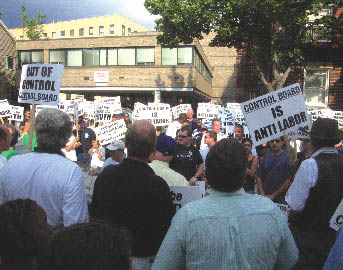Walking Wage-Freeze Blues
by Geoff Kelly

About 400 of the city’s unionized workers marched in circles on Irving Place in Allentown on Tuesday evening, briefly blocking Allen Street traffic, to protest the freeze on wage increases for city workers that has been in place for 28 months. The picketers gathered in front of the house of Dorothy Johnson, executive director of the city’s control board, which has said that the wage freeze will only be lifted if unions agree to concessions that save the city more money than the pay raises will cost.
It was a cheerful event, in all—plenty of laughter, back-slapping and see-you-next-week’s, the sort of camaraderie that can make a picket line fun and inspiring, at least toward the beginning of a prolonged campaign, which is what the city’s union leaders are promising. They seek to counteract what the Police Benevolent Association’s Robert Meegan describes as a propaganda campaign that aims to demonize the city’s working men and women.
The central talking point seemed to be this: The control board is made up of wealthy business people like Bob Wilmers of M&T Bank and Brian Lipke of Gibraltar Steel, both companies that, while generous benefactors to the city’s cultural community, enjoy tremendous public subsidies. Meegan claims that tax breaks to businesses have cost the city $67 million over the life of the wage freeze—a tricky figure to prove, to be sure, but attention-getting—and that those dollars “come out of the pockets of working men and women in this city.”
That’s a good message. Most Buffalonians cast a jealous eye on the wages and benefits that accrue to municipal employees, particularly teachers, police and firefighters. But they tend to be even more suspicious of big business and the perception that it milks taxpayer money from compliant local governments.
There are miscues in any PR campaign, of course: When Larry Panaro, secretary and treasurer for AFSCME Local 246, dropped the word “genocide” into conversation— as in the wage freeze is “nothing less than the economic genocide of the working class here in Buffalo”—the PBA’s Meegan took one subtle step away from him, wearing a smile that was at once cringing and bemused. Solidarity, certainly, Meegan’s expression seemed to say, but let’s keep the message tight and sympathetic.
Leaving aside the inflammatory rhetoric, Panaro and Meegan agreed that many in the region have the wrong idea about city workers, courtesy of talking points disseminated by the control board and the Brown administration, and disseminated by the popular media—especially the Buffalo News, of which Meegan said, “They’re very pro-business. They twist everything.”
Asked for an example of a statistic that misinforms the debate over the wage freeze, Panaro cited the average yearly pay of a city worker: $50,000. He said that number doesn’t reflect his constituency at all.
“I don’t represent anyone who makes $50,000,” Panaro said. “I don’t have one single salary in that range in the unit I represent, the City of Buffalo blue collar unit, AFSCME Local 264.”
Buffalo Public School Teachers enjoy an average wage of about $54,000, but it takes 11 to 15 years to reach that level of compensation, according to Phil Rumore of the Buffalo Teachers Federation, who also spoke at the demonstration. The maximum teacher contract is about $77,000, and it takes 28 years to hit that mark.
Some of the city’s employees have it better than others and none are quite so cushy as the public imagines. But, for PR purposes, they are all lumped together, giving the public the impression that, across the board, city workers make a more-than-comfortable wage, especially in a city where the median household income is around $34,000. Couple that with better retirement and healthcare packages than most working-class Buffalonians enjoy and it becomes difficult to generate much sympathy for the municipal worker. (The public relations tactic on the healthcare front has been to embarrass city police, firefighter and teachers with the arcane fact that their health plan covers plastic surgery, prompting Dorothy Johnson to mock city employees as “a lovely workforce.”)
And so, while the control board lumps them together, the city’s unions have promised that they will stand together—even the food service workers, who are being asked to make contract concessions in exchange for an hourly wage increase of 25 cents.
“We want to stand in solidarity with our brothers and sisters who are the food service workers, who have been asked to give a pound of flesh for a lousy quarter,” Rumore shouted to the crowd. “Are we going to let them do that to us?”
“No!” the crowd shouted back.
More pickets to come—if you live near a control board member, you might want to stay late at the office next week.
|
Issue Navigation> Issue Index > v5n34: Old McDonald Had a Farm (8/24/06) > The News, Briefly > Walking Wage-Freeze Blues This Week's Issue • Artvoice Daily • Artvoice TV • Events Calendar • Classifieds |









 Current Issue
Current Issue